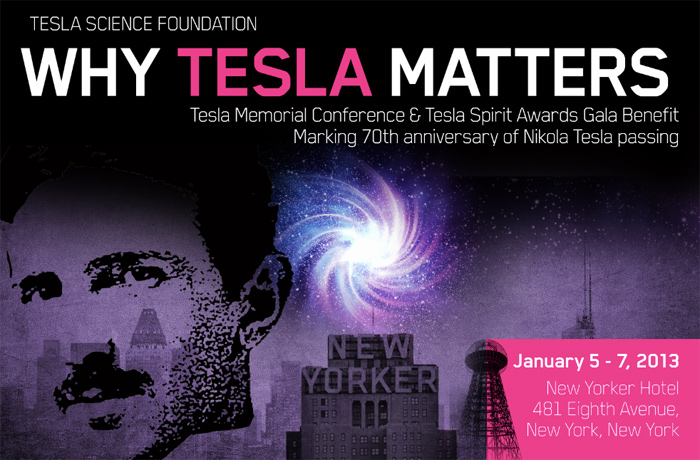
Welcome to the
Tesla Memorial
Society of New York Website
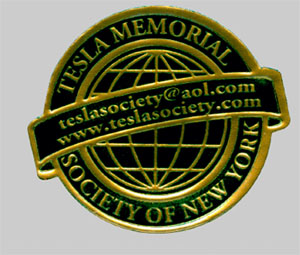
"Remarks to the Tesla Spirit Award Reception"
by Honourable Vuk Jeremic,
United Nations, General Assembly President
Above: Tesla Spirit Awards Benefit Reception on Saturday,
January 5th, 6:00 pm –8:00 pm
Grand Ballroom, New Yorker Hotel
481 Eight Avenue, NYC
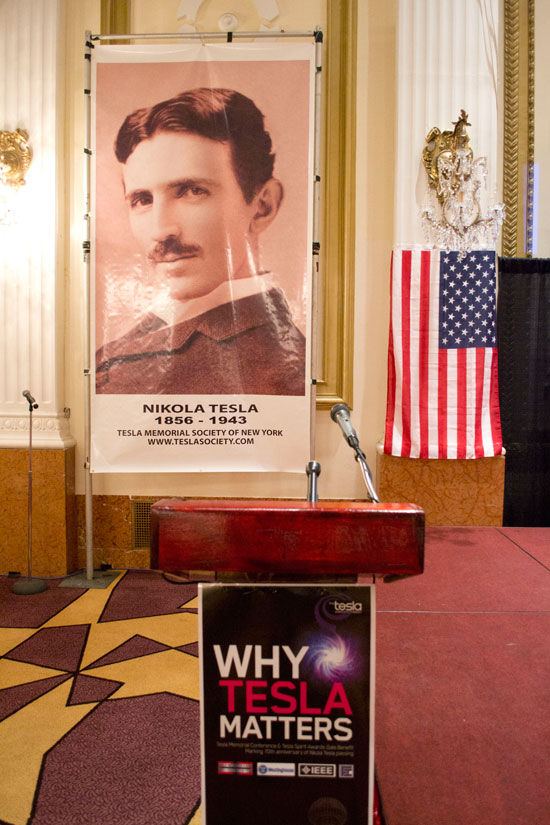
Above: Tesla Spirit Award Benefit Reception on January 5, 2013, Hotel New Yorker, Grand Ballroom

Above: Tesla commemorative plaque on Hotel New Yorker erected July 10, 2001 by the Tesla Memorial Society of New York and Hotel New Yorker.
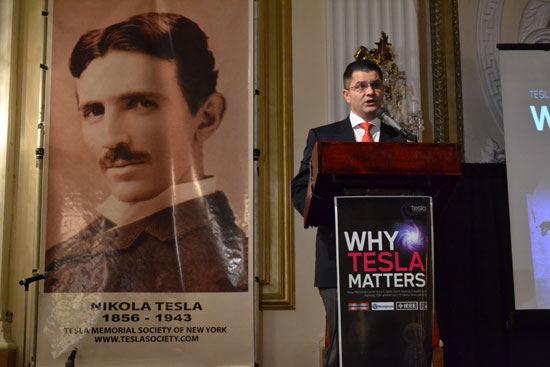
Above: Honourable Vuk Jeremic, UN General Assembly President.
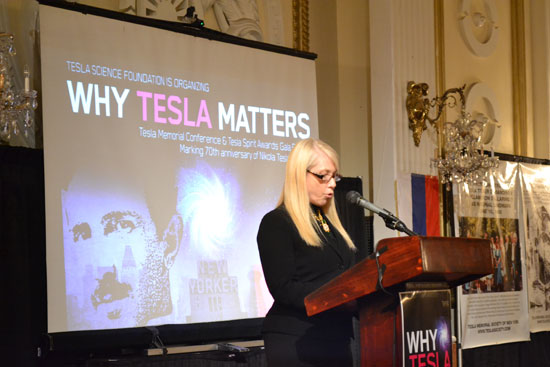
Above: Marina Schwabic, Benefit Chair - Tesla Science Foundation
giving the opening remarks
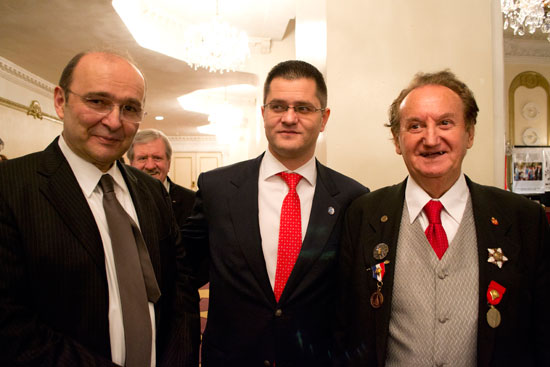
Above (left to right): Nikola Lonchar, President/Founder - Tesla Science Foundation, Vuk Jeremic, President - UN General Assembly and Dr. Ljubo Vujovic, President, Tesla Memorial Society of New York.
Vuk Jeremic is a Serbian politician and the former Minister of Foreign Affairs in the Government of Serbia. He was sworn in on 15 May 2007 and reelected on 7 July 2008. At the United Nations General Assembly presidential election, 2012 he was elected the president of the United Nations General Assembly for the sixty-seventh session of the United Nations General Assembly. Jeremic is also the president of Tennis Federation of Serbia. Click here for more information on Wikipedia.
Vuk Jeremic's Speech at The Tesla Memorial Conference - Tesla Spirit Awards Benefit, Hotel New Yorker, New York City, January 5, 2013
Your Royal Highness,
Excellencies,
Ladies and Gentlemen,
I would like to thank our hosts, the Tesla Science Foundation, for having invited me to address the Tesla Spirit Award Reception.
It is a great honor and a very special privilege for me.
This organization is owed a big debt of gratitude for being at the forefront of efforts to keep alive the memory of this remarkable man and his extraordinary contributions to humanity.
I believe there is no better place for us to gather in celebration of his life and works than here in the New Yorker Hotel, where he spent the last ten years before his death on January 7th, 1943—Christmas Day, according to the liturgical calendar observed by his native Serbian Orthodox Church.
Ladies and Gentlemen,
Nikola Tesla is probably best known for his work in refining alternating current, or AC, as the most efficient and safest way to transmit electrical power. In the 1890s, he worked with General Electric to install AC generators at Niagara Falls, creating the world’s first modern hydro-electric power station.
Tesla was a prolific inventor and ceaseless innovator. Before the end of the 19th century, he had built electric oscillators and motors, developed light bulbs, and invented a high-voltage transformer known as the Tesla coil.
Perhaps less well-known is his pioneering work in X-ray technology—or his groundbreaking research into wireless communication. In 1898 at the Electrical Exhibition held in Madison Square Garden, just a couple of blocks from here, Tesla demonstrated a radio-controlled boat in a pool—predating the work of Marconi. It is worth noting that in 1947, the United States Supreme Court finally credited Tesla as the inventor of the radio.
A little over a decade later, the Tesla unit of measurement for magnetic flux density was introduced, which notably drew further attention to the achievements of the “Man who Illuminated the Planet”—as some have taken to calling him.
More recently, individuals associated with the establishment of the Tesla Science Foundation have greatly helped to promote awareness of his work.
Such efforts were advanced in 2003, when the Serbian Government submitted our nation’s Nikola Tesla Archive to the UNESCO Memory of the World Register. The unique collection of manuscripts, photographs and science and patent documentation, is an indispensable tool for those who wish to learn about the contributions Tesla made to modern society.
Today, his memory is honored by monuments on both sides of the US-Canada border at Niagara Falls. New York State has proclaimed his birthday—July 10th—Nikola Tesla Day. This city has designated the southwest side of Bryant Park as “Nikola Tesla Corner.” His life is being fictionalized in a major motion picture, which is due to be released next year. Funding is also being secured to buy and restore his laboratory on a neglected 16-acre site on Long Island, so that a museum may be built there. And a company manufacturing up-market electric cars has been named after him.
Ladies and Gentlemen,
Some of you may know that I read physics at the University of Cambridge, England. When we were studying electro-magnetism, my professor began one of his lectures by referring to Tesla as “an eccentric Austro-Hungarian scientist.” I immediately raised my hand to correct that. “Tesla,” I said, “was not Austro-Hungarian—there is no such thing. He was Serbian.”
I must admit that I was not the brightest physicist of Cambridge, so the professor was somewhat skeptical of the veracity of my intervention.
At the start of our next session, however, he admitted that I had been correct—which didn’t happen very often.
Tesla, he remarked, was in fact Serbian. He did look it up, discovering also that his father had been a priest in the Serbian Orthodox Church.
For me, his Serbian heritage remains more than a biographical detail, for I strongly believe Nikola Tesla personifies some of the most positive features of Serbian national identity. His life stands as a testament to the fact that even if one comes from a most humble background, from a small place on the map like the Balkans, ability, hard work and perseverance may very well be enough to make one’s vision a reality.
I believe that Tesla may actually serve as a role model for our nation, which in the process of defining its place in a transforming world—a symbolic bridge between the past we came from, the unresolved issues we are confronting, and the future we seek to build for the generations to come.
Already, Serbia honors his legacy in several important ways. We named Belgrade International Airport after him, imprinted his portrait on our 100 dinar bill, and erected a statue of him in front of the Faculty of Electrical Engineering of Belgrade University.
We are justifiably proud of his discoveries and inventions, which effectively ushered the world into the modern era. Every time we switch on a light, plug in a computer, or use a cell phone, we should remember Tesla.
However, it is not only his incredible achievements that deserve to be celebrated, but his indomitable spirit—his quest to innovate, and his determination to challenge accepted norms and creatively push beyond present limits.
During his lifetime, Tesla often had to contend with what he described as a “blind, faint-hearted doubting world.”
In the face of formidable challenges, he never faltered. Tesla always found the courage to act according to his own convictions, propelled by a hope that beckoned him on in times of trial and adversity.
His strength of character and steadfastness of purpose remains an inspiration to all who possess the fortitude to persevere—to stay the course—when the odds seem to be stacked against them.
Ladies and Gentlemen,
As proud as he was of his Serbian roots, Tesla’s writings permeate a deeply-felt global conscience. Allow me to quote him: “Though free to think and act, we are held together, like the stars in the firmament, with ties inseparable.”
In this very hotel, a few months before his death at the height of World War Two, Tesla reflected on the bloody conflict that had engulfed his homeland. Not only were his compatriots a tragic victim of the Nazis and their fascist allies like the Ustasa—but so was all of Europe, together with much of the rest of the world.
He focused his attention not only on the carnage taking place—on the millions of lives lost—but on the sort of peace that would follow the cessation of hostilities. He felt strongly that the rules governing international relations would have to be re-written to account for the aspiration to justice of all nations—that this was indispensable to setting the world on a more secure, equitable and prosperous path.
In one of his notebooks, written in 1942, he scribbled a remarkable paragraph that in my view perfectly encapsulates the vision of the United Nations’ founders—which close to seven decades later, remains a work in progress.
I would like to read the quotation in full: “Out of this war, the greatest since the beginning of history, a new world must be born, a world that would justify the sacrifices offered by humanity,” Tesla wrote. “This new world must be [one] in which there shall be no exploitation of the weak by the strong, of the good by the evil; where there will be no humiliation of the poor by the violence of the rich; where the products of intellect, science and art will serve society for the betterment of peaceful life for all mankind, and not the individuals for achieving selfish wealth. This new world,” he concluded, “shall not be a world of the downtrodden and humiliated, but of free men and free nations, equal in dignity and respect for man.”
Ladies and Gentlemen,
One of the bodies established by the United Nations Charter in 1945 was the General Assembly—the UN’s chief deliberative, policymaking and representative organ.
The prerogative of the President of the General Assembly is to choose topics for thematic debates on international issues which, in his judgment, merit significant attention.
I decided to organize a critically important one in early summer, entitled “Climate Change, Green Energy, and Water Sustainability.” It will be done in partnership with the United Arab Emirates and the newly established United Nations Sustainable Development Solutions Network—spearheaded by the Director of its Secretariat, Professor Jeffrey Sachs of Columbia University.
It will aim to increase political awareness and support for the benefits of embracing the paradigm shift to renewable, low-carbon energy systems.
Perhaps it will be during this thematic debate where the spirit of Nikola Tesla will be felt most directly.
Back in 1931, he wrote a paper entitled “Our Future Motive Power”—likely the first article to refer to the “specter of exhaustion of our fuel stores that is looming threateningly in the distance.” It not only predicted the consequences of a future global energy crisis, but emphasized the critical importance of technological innovation in the energy field as the best way to overcome hydrocarbon dependence.
Ladies and Gentlemen,
Nikola Tesla’s life reminds us that every significant achievement begins as an idea in the mind’s eye before it becomes a reality—and that every great endeavor, rises from a commitment not to resign oneself to accept the beliefs of the majority as an unquestionable fact.
He stands as the embodiment of a spirit shared by the noblest and freest of men throughout history, who chose to conduct themselves in unqualified dedication to the pursuit of knowledge through discovery.
Let his unfathomable will and quiet self-confidence in the face of skepticism and mistrust remain an example to all who have the audacity to rise beyond the noise and rush of the common opinions of the day—the innovators and the risk-takers, the true inheritors of his great legacy.
Thank you for your attention.
